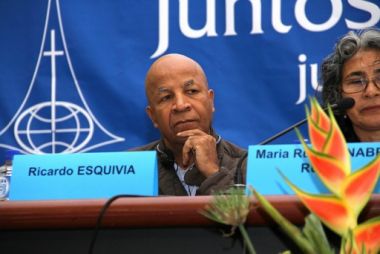Colombian Christian leader accused of FARC affiliation

As peace talks continue between the Colombian government and Latin America's oldest left-wing guerrilla insurgency, FARC (Revolutionary Armed Forces of Colombia), a case involving a prominent Christian leader highlights the difficulties faced by those who seek to mediate between the opposing sides.
At the other end of the political spectrum from the Communist-inspired FARC are right-wing paramilitaries, with roots in vigilante groups set up decades ago by landowners for protection against FARC rebels.
Now a pamphlet produced by one such paramilitary group, Los Urabeños, has accused Ricardo Esquivia Ballestas, director of the Mennonite church-affiliated Foundation Sowing Seeds of Peace, of affiliation with FARC. It accuses him and other community leaders of promoting the return of the armed group to the mountain region of El Carmen de Bolivar in the northern Colombian department of Bolivar. He is also accused of robbery and extortion.
World Watch Monitor learned from local sources that state authorities in the military and the judicial branch have accepted the pamphlet's accusations against Esquivia.
The accusations likely stem from his organisation's work in helping return land to farmers displaced by paramilitary groups between 2000 and 2004. Government authorities often misunderstand the motivations of human rights workers, assuming them to be affiliated with leftist rebels.
On September 9th, a fellow community leader, Jorge Montes, who has already been arrested, was charged with 'belonging to FARC, criminal conspiracy, extortion and other crimes.
The Advocacy Program for Latin America of the US-based Mennonite Central Committee, whose motto is "Relief, development and peace in the name of Christ", has called for urgent action for the "physical and judicial security of Esquivia, and the right to a good name and due process".
For decades El Carmen de Bolivar has been beset by violence. Until the mid-2000s the conflict was between the right-wing paramilitaries, the United Self-defense Forces of Colombia (AUC) and the FARC, which long vied for control of this region's cocaine production. Following the AUC's demobilization, various armed gangs have fought the FARC for control.
Esquivia, a lawyer, is co-founder and director of the Commission for Restoration, Life and Peace of the Evangelical Council of Churches of Colombia (CEDECOL). Additionally he founded and formerly directed Justapaz, the Christian center for justice, peace and nonviolent action of the Mennonite Church of Colombia.
He has promoted peace and community development in Colombia for more than 40 years, receiving international peace awards from the New York-based Tanenbaum Center for Interreligious Understanding and the Fellowship of Reconciliation. He has represented non-Catholic religious groups on the National Council of Peace, which advises Colombia's president.
Despite Esquivia's lifelong devotion to bringing peace to the war-embattled country, Colombian authorities have levied similar allegations against him numerous times over the past 25 years, issuing warrants for his apprehension or threatening legal action against him.
Peace talks between the FARC and Colombia's government are on-going in Cuba. President Juan Manuel Santos has imposed a November deadline for a resolution to be agreed. In the meantime, the civil conflict, which has raged for decades, goes on.
Colombia is No. 46 on the 2013 World Watch List, an annual ranking of the 50 countries where life as a Christian is most difficult. "Christians continue to be targeted for persecution because of their presence as an alternative pillar of society and their witness through their involvement in social and political activities," reports the List.











